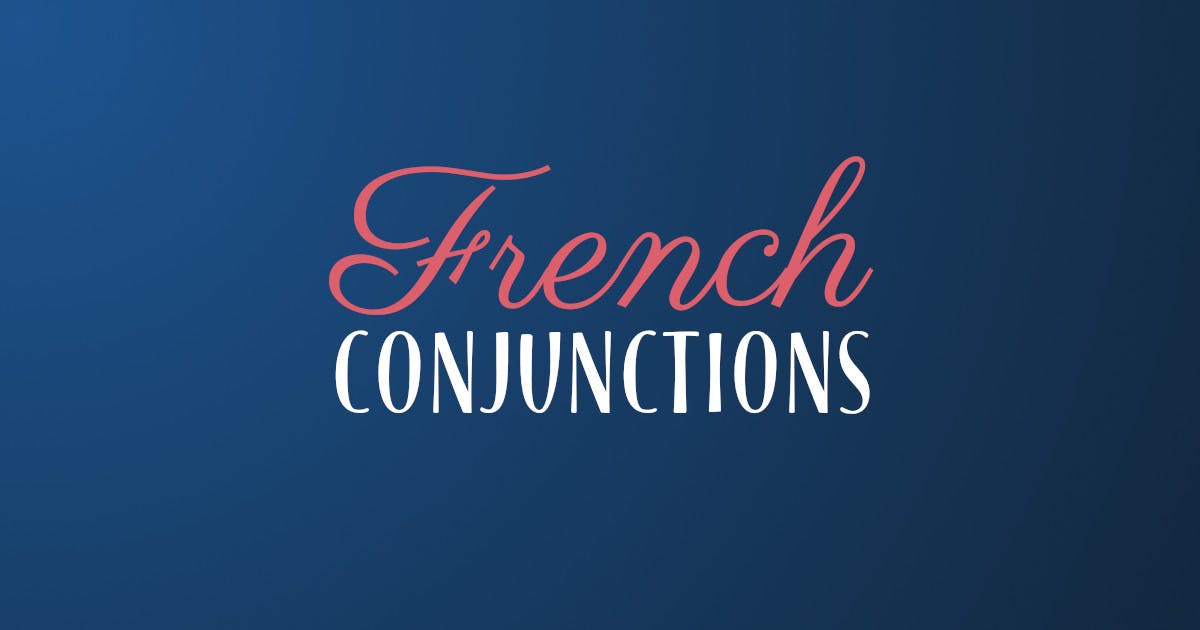Everything You Need To Know About French Conjunctions
Les Conjonctions Francaises
In order for whole sentences to make sense, their different parts must be linked in a logical, meaningful fashion.
This linking role is played by conjonctions — the word literally means joining together — which comes in two different categories: coordinating and subordinating conjunctions.
Coordinating Conjunctions
These link clauses (either words and/or sentence fragments) which are of equal importance.
There are 7 such conjunctions in French: mais / but; ou / or; et / and; donc / thus, therefore; or / but, yet; ni / neither; car / for, because.
There is a mnemonic trick to remembering these, at least in French.
Since some of the conjunctions are homophones of other French words, all you need to remember is the following:
Mais où est donc Ornicar? (But where is thus Ornicar?)
| Conjonctions | Conjunctions |
|---|---|
| Je suis un fan de La Guerre des Étoiles mais je n'aime pas Les Dents de la Mer. | I'm a fan of Star Wars but I don't like Jaws. |
| Il a dû le cacher dans le tiroir ou dans le placard. | He must have hidden it in the drawer or in the closet. |
| Elle a reçu des robes et des chaussures comme cadeaux. | She received dresses and shoes as gifts. |
| Je pense donc je suis. | I think therefore I am. |
| Il m'avait promis qu'il serait là or il n'est pas venu. | He had promised me that he would be here but he didn't come. |
| Elle n'a vu ni Paul ni Pierre. | She saw neither Paul nor Pierre. |
| Nous avons eu peur car il ne répondait pas au téléphone. | We were scared because he wasn't picking up the telephone. |
Subordinating Conjunctions
These link a main clause with subordinated/dependent clauses.
You will be able to quickly recognize the majority of them as most incorporate que / that as part of a conjunctive phrase.
The special thing to note is that some of them dictate the use of the specific modes (e.g. indicative, subjunctive or conditional) in the subordinated clause.
Here's a list of subordinating conjunctions:
Causality*:* comme / because; parce que / because; puisque / since; étant donné que / given that**; vu que** / seeing that**; sous prétexte que** / under the pretext that **(indicative). **
Effect*:* à tel point que / to the point that**; si bien que** / so well that**; au point que /** to the point that**; de sorte que** / so that**; de façon que** / in such a way that**; si/tellement/tant… que** / so much that (indicative).
Simultaneity*:* au moment où / at the moment when**; en même temps que** / at the same time that**; pendant que** / while**; tandis que** / while**; alors que** / while, whereas**; lorsque** / when**; quand** / when (indicative).
Anteriority*:* avant que / before**; jusqu'à ce que** / until**; en attendant que** / while, until (subjunctive).
Posteriority*:* après que / after that**; dès que** / as soon as**; aussitôt que** / as soon as**; une fois que** / once (indicative).
Goal: afin que / so that**; de façon à ce que** / in such a way that**; de manière que** / in such a way that**; pour que** / so that (subjunctive).
Negative goal (something to be avoided): de peur/crainte que / for fear that **(subjunctive). **
Comparison*:* comme / like**; de même que** / just as**; ainsi que** / just as, so as**; plus/moins que** / more/less than (indicative).
Concession: quoique / even though; bien que** / even though**; malgré que** / in spite of the fact that **(subjunctive). **
Restriction: même si / even if (indicative ); encore que / even though**; en admettant que** / assuming that (subjunctive).
Alternative restriction: tandis que / while, whereas**; alors que** / while, whereas **(indicative). **
Conditionality: si / if**; même si /** even if (indicative)****; au cas où / in case that (conditional)****; à condition que / provided that**; pourvu que** / provided that**; à supposer que** / assuming that **(subjunctive). **
Negative conditionality: à moins que / unless (subjunctive); sauf si / except if**; faute de quoi** / failing which (indicative).
Proportionality*:* à mesure que / as; chaque fois que / each time that**; toutes les fois que** / every time that (indicative)
Quoique (even though), the conjunction, should not be confused with quoi que ( whatever the case may be, no matter what), the relative pronoun construct.
| Conjonctions | Conjunctions |
|---|---|
| Ils l'ont choisi pour leur équipe parce qu'il est grand. | They chose him for their team because he is tall. |
| Nous l'aidions afin qu'il puisse se remettre de son accident. | We were helping him so that he could recover from his accident. |
| Elle se levait tôt de peur qu'elle ne rate son train. | She got up early for fear that she might miss her train. |
| Elle regardait la télévision alors que j'attendais en bas. | She was watching television while I was waiting downstairs. |
| Si tu ne viens pas, je ne te parlerai plus. | If you don't come, I won't talk to you anymore. |
| Elle m'a surpris au moment où je m'y attendais le moins. | She surprised me at the moment when I least expected it. |
| Le film lui a tellement plu qu'il est retourné le voir plusieurs fois. | He enjoyed the movie so much that he went back to see it several times. |

SUBSCRIBE: